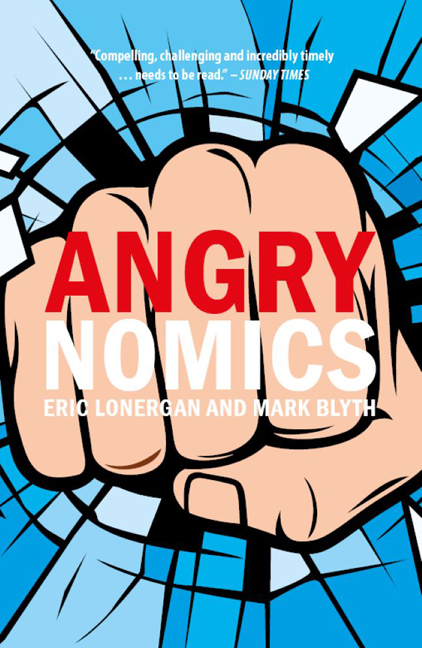Book contents
- Frontmatter
- Contents
- Dedication
- Acknowledgements
- Introduction: from economics to angrynomics
- Dialogue 1 Public anger and the energy of tribes
- Dialogue 2 The moral mobs and their handlers
- Dialogue 3 Macroangrynomics: capitalism as hardware
- Dialogue 4 Microangrynomics: private stressors, uncertainty and risk
- Dialogue 5 Calming the anger: from angrynomics to an economics that works for everyone
- Conclusions
- Postscript: angrynomics in a pandemic
- Further reading
- Notes
- Index
Dialogue 3 - Macroangrynomics: capitalism as hardware
Published online by Cambridge University Press: 20 December 2023
- Frontmatter
- Contents
- Dedication
- Acknowledgements
- Introduction: from economics to angrynomics
- Dialogue 1 Public anger and the energy of tribes
- Dialogue 2 The moral mobs and their handlers
- Dialogue 3 Macroangrynomics: capitalism as hardware
- Dialogue 4 Microangrynomics: private stressors, uncertainty and risk
- Dialogue 5 Calming the anger: from angrynomics to an economics that works for everyone
- Conclusions
- Postscript: angrynomics in a pandemic
- Further reading
- Notes
- Index
Summary
“We praise a man who feels anger on the right grounds and against the right people”
ARISTOTLEThe parable of the three economists
Karl was, if truth be told, more of a historian than an economist. Indeed, deep down inside, he thought that the whole turn of the world in the nineteenth century to market exchange, wage labour, and making everything into a commodity for sale for the sake of profit, was a thoroughly bad idea. His hunch was that labour was unique among commodities in that it was not really a commodity at all. Labour was, after all, like Soylent Green, made of people. And while Soylent Green cares not a jot what it costs, people do. And if the world around them changes in such a way as to make them poorer, through no fault of their own, they will get very angry and demand that the state protect them against these “market forces”. People laughed at Karl. They assured him that markets were as natural as the air we breathe, and provided, as Dr Pangloss promised, “the best of all possible worlds”. And then the world collapsed in the 1930s and people everywhere rebelled against markets.
John was, if truth be told, more a mathematician and a philosopher than an economist, but perhaps that's why he could discern another truth. That supply does not create its own demand because individuals’ decisions to consume and save and invest are separate from each other in time. Once you realize this, recessions and depressions suddenly make sense. If investors get depressed about the future, they will not invest now, which brings about the very outcome they are trying to avoid in the future, a recession. John thought he had found the answer to curing depressions. It's simple really. If your expectations of the future are depressed, all you had to do was spend some cash today to raise the level of prices tomorrow, and investors would start investing again today, anticipating profits ahead. The point of spending was not spending. It was to shift expectations of future profits. But when John's ideas became popular, Mikhał, who came from the same part of the world as Karl, found a flaw in John's logic that echoed Karl's hunch about labour.
- Type
- Chapter
- Information
- Angrynomics , pp. 59 - 86Publisher: Agenda PublishingPrint publication year: 2020



